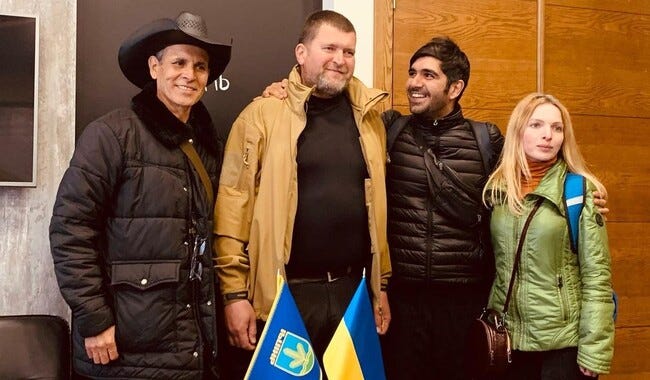Political.tips Exclusive: Ryan Routh Iranian Contact Revealed
Ryan Routh, the man who federal authorities charged with trying to assassinate President Trump, gave a shout out to "Ali."
Ryan Routh spent more than 12 hours waiting in the stifling heat of Palm Beach, tracking then-candidate Donald J. Trump around one of his golf courses. According to a federal indictment, he was planning an assassination attempt on the soon-to-be 47th President of the United States. What was going through his mind during that time remains unknown. However, before his arrest on that sweltering mid-September day in 2024, Routh had already laid out his beliefs in a self-published book, Ukraine’s Unwinnable War. Though the book primarily covers his four months in Ukraine, it also delves into broader geopolitical themes, with repeated references to Iran and its people.

Throughout his memoir, part personal account and part political treatise, Routh discusses his encounters with Iranians, often in a defensive tone. This was despite having had no previous visits to or deep connections with the country until his interactions with Iranians upon his arrival in Ukraine. In one passage, he describes working with a man in a Kyiv-based drone startup who was later detained in the UK on terrorism charges. In another, he criticizes Ukraine’s International Legion for questioning him about his contacts with Iran when he attempted to join the Ukrainian Defense Forces. Across nearly 300 pages, he mentions Iran more than four dozen times. Near the end, on page 279, he makes a startling statement regarding failed nuclear negotiations:
"Iran, I apologize. You are free to assassinate Trump as well as me for that error in judgment for dismantling the deal."
Routh, who came to the attention of Ukrainian intelligence as early as October of 2022, was arrested for allegedly attempting to assassinate now-President Trump more than a year and a half after publishing his book. One of the individuals he mentions in his writings was previously known only as “Ali,” but has now been publicly identified. According to phone records obtained by Political.tips and the results of informal investigative cooperation between the US government and Ukraine’s SBU, “Ali” can be positively identified as Mohammed Ali Pakzad, an Iranian journalist with an unusual career trajectory.
At the end of January, a message arrived from Washington D.C. to Ukraine’s Defense Intelligence (GUR) requesting information on any communications between Pakzad and Routh. While GUR was unable to offer any new information to the United States, Ukraine’s main state security structure, the SBU, possessed records showing that Pakzad had received journalist credentials from the Armed Forces of Ukraine in the early months of Russia’s full-scale invasion. He covered the aftermath of war crimes in Bucha, met with the mayor of Irpin, and became acquainted with Routh—an association significant enough for mention in his book.

Pakzad’s rapid rise to prominence raises questions. Initially a photogenic film critic, he transitioned almost overnight into war reporting, appearing in geopolitical hotspots with remarkable speed. In the fall of 2021, he and his photographer were in Afghanistan, embedded with Taliban fighters shortly after the U.S. withdrawal. A few months later, they traveled to Ukraine as the full-scale invasion began. Some reports suggest that Pakzad and Routh first met in Poland. After his assignments in Ukraine, Pakzad drew international attention for what some described as a contentious interview with the Russian ambassador to Tehran. Once focused on film theory, he was now a well-known figure in Iranian media.
When asked for comment, Pakzad distanced himself from any political connections. He described himself as an “independent journalist” with “no political or government ties.” Initially, he indicated he would provide further clarification, saying, “Please wait a little while. I will inform you.” However, nothing further was forthcoming, and he has since remained silent despite multiple attempts by Political.tips for Pakzad to expand on his experiences with Routh.
Pakzad’s background includes work in Turkey, Afghanistan, and Syria—common destinations for an Iranian journalist. However, his presence in Afghanistan, given Iran’s complex history with the country, stands out. Meanwhile, another pattern emerges in Routh’s writings: his fixation on recruiting Afghan fighters to war zones in both Ukraine and Taiwan. In a similar vein to his writeups on Iran, Routh had never spent time in Afghanistan.
With Routh in prison and Pakzad refusing further comment, the full extent of their relationship remains unclear, and the depth of their discussions unknown. An upcoming hearing on the case slated for March 20th and focused on how much evidence in the case will remain classified means the full truth of how deep the collaboration between the Iranians and Routh went may not be come into focus for sometime. However, Routh’s actions suggest that his interest in Iran, much like his alleged desire to kill Trump, extended beyond the pages of his book.


